This article previously appeared on Crossfader
The Deputy charges headfirst into a fortified nuclear bunker, crawling with crazed cultists dedicated to stopping every advance. In a tense cacophony of bullets and blood, the Deputy carves a path to the bottom to find a long-lost partner. She doesn’t recognize the Deputy at first, and confusing you for one of her sadistic captors, relentlessly attacks with a crowbar, fighting to defend her life. Eventually she relents, crying out in an anguished mix of anger, frustration, and terror. She recalls her capture, torture, and compulsion to exact revenge. She falls down to her knees, weak and broken, feebly trying to quiet her cries.
I want so badly for my character to offer words of comfort, to tell her that I am here to help, that I would get her safely back home, that we will both get revenge on the people that did this. I just wanted to say something, anything, to let her know I was there for her.
Instead, the Deputy says absolutely nothing, pats her on the shoulder, and rises to resume the carnage.
Moments like this are a day in the life of FAR CRY 5’s silent protagonist, a man (or woman) who ruthlessly tears across the mountains and valleys of Montana in complete silence. Characters call out to you asking for help, fire off quips while riding shotgun, or graciously thank you for your efforts, only to be met by the Deputy’s mute stare. Villains try to corrupt you with grandiose speeches and emotional torture, but never once does the Deputy dignify them with a response. I spent countless hours alongside friends and enemies who tried their damndest to leave an impression on me, but my avatar’s inability to interact with the world (outside of blowing it up) squanders any emotional attachment I could have with the world or its inhabitants.
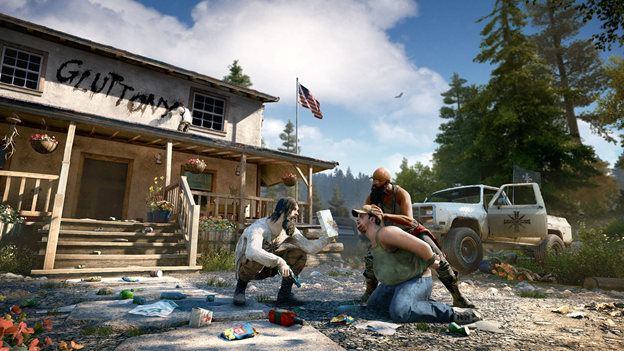
“You’ll never get me to talk!”
FAR CRY 5 came, and despite recently launching its first DLC expansion, has already left the public spotlight. Plenty of gamers have already criticized the game for pulling almost all of its punches with the gun-toting Christian extremists that serve as its antagonists, from how they refuse to name drop Jesus Christ to how the gameplay is a bonafide celebration of the Second Amendment. Despite having all the ingredients of a controversial takedown of the current state of affairs in America, FAR CRY 5 might be the least political game to come out of Ubisoft in a good while. But it takes both sides to say nothing for a conversation to be truly meaningless, and in that spirit, I want to focus on the less discussed aspect of FAR CRY 5: the nameless Deputy.
The cognitive dissonance displayed in my introductory scenario pervades throughout every aspect of FAR CRY 5, leaving the latest entry of a franchise known for its rich characterization bereft of an emotional core. As fun as it is to carry a massive machine gun and tear through hordes of a psychotic militia, it always felt like something was missing, like violence without conflict. But beyond diminishing my connection to the game as a whole, the Deputy highlighted the importance of character and how it affects what a video game is ultimately able to say.
The Silent Protagonist is not a new trope in video games. Rather, it has existed since the beginning, before voice acting, when games were primarily based around text. But even in text form, developers had to choose whether their hero had a voice of his own. Most of the time, the idea behind the silent protagonist allows the player to put their own mind inside the character and “become them.” THE LEGEND OF ZELDA series has always allowed players to name their version of Link, and he has always remained silent, even up to the newest iteration, BREATH OF THE WILD, which allows some of its side characters to have a voice.

“Hyahh!”
The Silent Protagonist trope can be an effective means of storytelling, but it requires a narrative that facilitates its use. For example, the original BIOSHOCK used the trope as means of exploring player agency, as its hero carried no free will of his own. You are meant to feel like a puppet, so you are given as few identifiable traits as possible. In contrast, the rebooted DOOM featured a mute marine exterminating a horde of demons. Doomguy expresses his agency through action, routinely ignoring commands from NPCs, turning off intercoms during conversations, or smashing consoles when told to treat them gently. He’s not here to start a dialogue: the only talking he does is with his fists.
While almost polar opposites, both of the scenarios mentioned above demonstrate a requirement for a successful silent hero: a narrative that justifies their silence. Furthermore, they employ a certain technique to facilitate the use of a silent primary character—NPCs interactions are typically done AT the character, rather than WITH the character. Like an incredibly traumatic episode of DORA THE EXPLORER, many of the characters in FAR CRY 5 ask questions that your character is troublingly unequipped to answer. Others will gratefully thank you for helping save their town, just to walk away without a response.
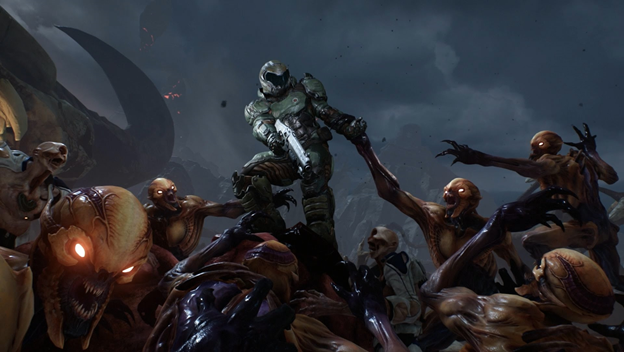
In Hell, no one can hear you over all the screaming imps
The typical silent protagonist, especially one whose appearance is customizable, never truly defines themself or extends a personal connection to the player. Whether played as a male of female, characters who converse with (at) FAR CRY 5’s Deputy never change up their diction, gestures, or even pronouns (the game assumes you are a man). These interactions are nothing more than face value. They always play out exactly as you would expect, your hero never challenging the expectations or tropes presented to you.
The recent WOLFENSTEIN games from developer MACHINEGAMES surprised me with their focus on character, given that series protagonist BJ Blazkowicz had previously been non-existent beyond a gun in a hand. My expectations didn’t extend beyond a fun and explosive diversion, but instead, BJ’s tortured internal monologues and tender interactions with others made me care for him and want to help him succeed in ways that didn’t just involving liquefying Nazis with a laser beam. It wasn’t just about taking down an evil totalitarian government; it was about helping shape a better future for his loved ones. This unexpected focus on family made the game’s events much more powerful than anything associated with a series best known for Mecha Hitler has a right to be. With an emotionally charged hero at the helm, even the most banal concepts can take on greater meaning.
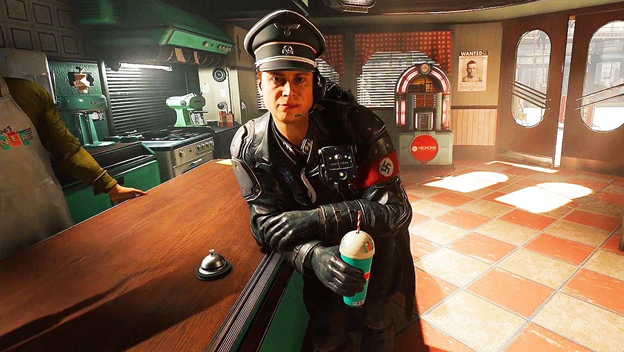
“Sprichst du nicht?”
Similarly, I found the personal journeys of Jason in FAR CRY 3 and Ajay in FAR CRY 4 to be what kept me invested behind the ever-repetitive gunning down of enemies. FAR CRY 3 dropped a normal 21-year-old on island savaged by pirates and examined how the barbarism of war could drive innocents to commit horrible acts. FAR CRY 4 questioned the fragility of identity and family through Kyrat’s brutal civil war. Both games offered a persona for me to inhabit, to sympathize with, and to ultimately shed as their conflicts reached their conclusions.
In FAR CRY 5, the Deputy guns down organized criminals because that is in the job description. Along the way, the Deputy is kidnapped, tortured, and presented with such extreme acts of religious zealotry that mind and personality ought to be warped. Previous heroes in the series were faced with similar moral quandaries that forced them to reveal their true character. But in the Deputy’s case, each of the encounters with Joseph Seed’s lieutenants do little to propel the narrative forward, and even less for the character’s arc. It’s not uncommon for a character to begin a game as a blank slate, but it is for them to remain that way when the credits roll. With the Deputy, there is nothing to inhabit, and nothing to understand. There are no choices and no evolution. The game encourages players to take back their homeland, but why should we? Our hero doesn’t have any stake in it, and so neither do we.
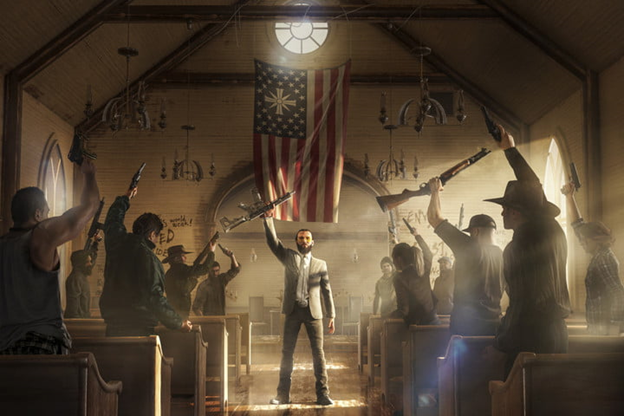
You really have to break a sweat to not make a statement with this much imagery
With a protagonist who is a mute stranded amidst a radicalized cast, the player is forced to cling to other characters and beliefs than their own. Purely by default, I found myself more intrigued by the villain and his clear motivation. A rambling madman whose arguments fall flat if you step back from the controller, Joseph Seed is nevertheless a more compelling character than my own, simply by merit of being a character. This is par for the course when it comes to the Far Cry franchise, but unlike previous entries, FAR CRY 5 is not a debate. There is only one voice speaking, and it’s that the game demands your silence.
FAR CRY 5 was a fun game, but because it has no message, I doubt I’ll remember it. I mostly blame its silent hero for this. It’s one thing to avoid controversy so your game will sell, but it’s another entirely to not offer anything else at all. There are plenty of people who will love FAR CRY 5 for its diversions and expansive open world, but without something to fight for, Ubisoft achieved the impossible: making a bloodbath bland.
The blank slate is a dying trope, and for a good reason. As the video game industry grows more and more mature each year, we receive works that demonstrate fully fleshed-out characters can exist with a player calling their shots. Games like HELLBLADE, where players can truly get inside the head of a character, or GOD OF WAR, which shows how even the flattest characters can be lent new life and emotion. But that is not to say an effective mute character is impossible. Even titles like PREY or INSIDE, where our characters do not speak, still manage to find ways to say something. No matter what form it takes, a game needs to have a message, and it’s the senseless murderthons like FAR CRY 5 that ultimately hold the medium back.








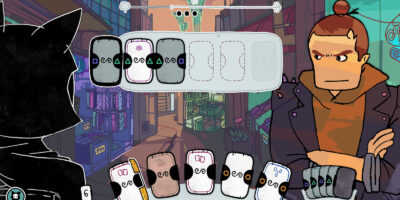







Comments